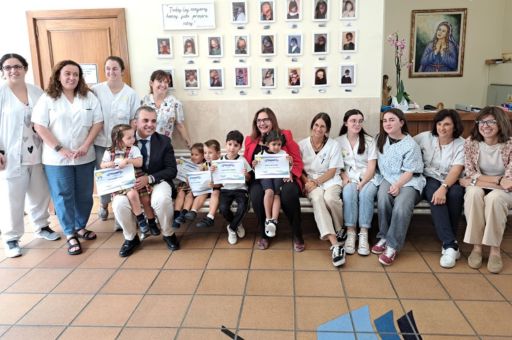The councillor for Health, Manuela García, and the councillor for Education, Antoni Vera, attended the vaccination of 237 children at the Santa Mónica school in Palma, 65% of those vaccinated.
The pilot school immunisation plan continues, with 2,900 students born between 2019 and 2021 to be vaccinated.
The councillor for Health, Manuela García, accompanied by the councillor for Education, Antoni Vera, went today to the Santa Mónica school in Palma to show her support for the flu vaccination of 237 children in the second cycle of infant education, 65% of the 365 children enrolled in the school at these educational levels.
TDB keeps you informed. Follow us on Facebook, Twitter and Instagram
The Pilot Plan for Childhood Immunisation against the flu has now been completed in 16 schools
The heads of Health and Education were accompanied during their visit to the Santa Mónica school by the director of Primary Care Nursing, Victòria Pascual, and Toñi Tarongí, pedagogical director of Infant and Primary Education, among other authorities.
Manuela García welcomed the high percentage of pupils whose parents gave their permission for them to be vaccinated and thanked them for their responsible attitude, reminding them that vaccination is recommended for this group of healthy children because the flu does not cause the most common symptoms of the epidemic disease, such as fever and fatigue, among them. ‘Young children who contract the flu can have serious complications such as pneumonia, asthma attacks or otitis,’ he said.
Vaccination is also recommended for this group even though the lethality rate among children under 15 years of age is very low. Ninety-five per cent of children who die from the disease are under five years of age.
Moreover, this age group has the second highest rate of hospitalisation and ICU admission due to influenza after the elderly. Not to mention the role that these children play in transmitting the flu in their homes and with their close relatives, sometimes elderly and fragile people in whom contagion can have tragic consequences.
These children under five years of age have been immunised as part of the pilot child vaccination plan, which was launched in coordination with the Ministries of Health and Education on Monday 14 October and will continue until 14 November. In this pilot scheme, 2,900 schoolchildren born between 2019 and 2021 from 24 public and state schools on the islands, as well as one private school, will be able to be immunised in their school. Eleven schools in Mallorca, eight in Ibiza and Formentera and five in Menorca are participating in this plan. This pilot plan has already been completed in 16 schools.
The acceptance rates for this vaccination at school have been as follows, by island: in Mallorca, 52%; 40% in Menorca; 32.3% in Ibiza and 50% in Formentera.
The children participating in this pilot plan are immunised in complete safety. Nurses from the health centres closest to the schools come to the classrooms with a first-aid kit to treat any possible adverse effects of the vaccines and remain there for up to half an hour after the last child has been immunised to prevent them from occurring. Children with severe egg allergies or intolerances or those with significant immunodeficiency will be excluded from this school vaccination.
Children aged 2 years to 4 years and 11 months have been given a convenient and painless intranasal flu vaccine. For the youngest children, from six months to two years of age, an inactivated injectable vaccine will be administered.
